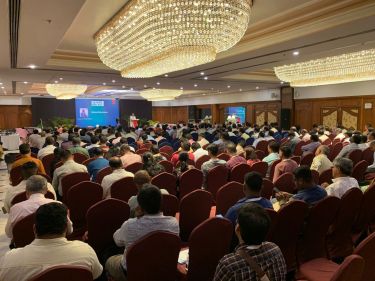
Nearly 450 evangelical leaders from across India concluded a four-day gathering in Nagpur last week with an unprecedented call for the Indian Church to prioritise spiritual depth over numerical growth, marking what organisers described as a watershed moment for Christianity in the country.
The All India Congress on Church in Mission, held from 15th-18th September, brought together the most representative assembly of evangelical leadership in recent decades under the theme “Being the Church in the Changed Context of India.”
EFI General Secretary Rev. Vijayesh Lal told Christian Today: “This was no routine meeting. Many recognised it as a time given by God, a kairos in which the Church was summoned to look honestly at itself, to confess its weakness, and to seek fresh direction for faithful mission in India.”
Internal Challenges Take Precedence Over External Threats
The Congress opened with a prophetic warning that reverberated throughout the four days. The keynote speaker declared that “a Church broad but shallow cannot stand,” identifying three dangerous gaps undermining Christian witness in India: the chasm between gospel proclaimed and disciples actually formed, the divide between doctrines affirmed and lives actually lived, and the contrast between outward expansion and inward spiritual maturity.
Delegates across various sessions acknowledged these as genuine challenges rather than minor issues, with many admitting that churches pursuing numerical growth without corresponding spiritual depth risk building on unstable foundations.
The Congress structured its content around five major plenary sessions addressing core Christian concerns. Dr Paul T Mathews opened with a message from Romans 1:16, emphasising that authenticity, purity, unity, and boldness must characterise the Indian Church. He warned against substituting institutional success for genuine integrity, while Rev Dr Praveen Paul followed with sharp criticism of treating churches like marketplaces.
Bishop P K Samantaroy insisted that evangelistic mission remains unfinished business despite numerical church growth, emphasising that leadership represents trust rather than possession. Dr A K Lama contributed a vision of leadership marked by integrity and spiritual authority rather than extended tenure, warning against raising leaders unprepared for long-term challenges.
One of the Congress’s most heart-wrenching moments came when delegates confronted the reality of pastoral isolation across India. Speaker after speaker testified to the burden carried by ministers labouring in loneliness, struggling with depression, family pressures, and professional isolation while caring for others. The response was the immediate establishment of a Shepherding Commission dedicated to providing pastoral care for pastors themselves.
Social Justice and Inclusion Receive Unprecedented Focus
In one of the most courageous institutional declarations in recent evangelical history, the draft Nagpur Declaration names caste as “sin against the gospel.” The document, forged through prayer and painful honesty, begins with corporate confession of sins that have weakened the Church: pride, fear, division, and silence in the face of injustice.
Dr Jayakumar Christian challenged delegates with a radical vision: the Church must not merely serve those “among” the margins but position itself fully “in” the margins. True faithfulness to Christ, he argued, requires not patronising charity but genuine solidarity with the poor, the excluded, and the oppressed. “If our faith makes sense to the weakest link in the chain,” he declared, “then it will make sense to all of India.”
Track discussions revealed that caste divisions continue affecting church practices in various regions, from seating arrangements to marriage practices, burial grounds, and leadership selection, despite official denominational positions opposing such discrimination.
The Congress made significant commitments to women’s empowerment within evangelical structures, with the Nagpur Declaration’s commitment to gender justice representing what observers called an evolution in evangelical institutional thinking. Several prominent women addressed plenaries and led track discussions while new working groups will address barriers preventing women from accessing leadership development opportunities.
Dr Sanjay Patra emphasised that excellence in governance, financial management, and civic engagement constitute forms of Christian witness, urging Christians to demonstrate professional integrity as public testimony to their faith.
Contemporary Ministry Challenges Address Modern Context
Healthcare received significant attention when Dr Deepak Singh noted that Christian missions operated over 1,000 hospitals at independence, but only a fraction remain active today. He urged renewed Christian engagement in medical ministry, particularly in underserved rural areas where access remains limited despite containing most of India’s population.
Dr Santhosh T Mathew presented a vision of the Church as a “wounded healer” - a community that embraces the broken precisely because it knows its own brokenness. He insisted that trauma care, mental health ministry, healthcare, and education are not peripheral concerns but flow from the very heart of Christian calling.
For the first time in AICOCIM history, digital engagement received dedicated institutional attention through both a commission and working group. Leaders acknowledged that technological transformation has fundamentally altered how Indians, particularly younger generations, receive and process information. The new Digital and AI Commission will address both opportunities and challenges, including concerns about misinformation, digital discipleship methods, and maintaining authentic community in online environments.
Speakers noted that COVID-19 accelerated digital adoption across Indian Christianity, but many churches remain unprepared for sustained digital ministry, requiring strategic thinking about technology rather than merely reactive responses.
Rev Dr Atul Aghamkar focused on urban mission as neighbourly love, patience, and public justice rather than programming approaches, noting that urban Indians often respond better to relational authenticity than large-event evangelism. With India’s continuing urbanisation, delegates recognised that effective city engagement requires more sophisticated strategies than traditional rural mission models.
Dr John Dayal’s call for research-based ministry planning represented a significant departure from traditional approaches, with the Congress acknowledging that Indian Christianity lacks reliable demographic and social data necessary for effective planning. A new Research and Future Readiness working group will focus on mapping Christian communities, studying social trends, and providing systematic data for strategic decision-making.
Institutional Outcomes and Future Direction
The Congress produced far more than resolutions and good intentions. EFI announced five new commissions and multiple working groups that will carry the burden of transformation into the coming years. These are not bureaucratic additions but battle stations in the fight for the soul of Indian Christianity: commissions on discipleship formation, justice for Dalit and Adivasi Christians, shepherding and pastoral care, families and singles, and engagement with the digital age.
Beyond permanent commissions, EFI established working groups focusing on evangelism, grassroots theological education, leadership development, mental health ministry, research initiatives, media engagement, and women’s and youth empowerment. These groups aim to bring together leaders and practitioners, translating Congress discussions into practical steps for coming years.
The Congress served as the launch platform for EFI’s 75th anniversary celebrations under the theme “To God be the Glory.” Planned activities include 75 weeks of nationwide prayer, regional gatherings, new resource centres for church strengthening, and creation of a digital archive preserving evangelical witness history in India.
The draft Nagpur Declaration combines corporate confession with covenant renewal, calling Indian Christianity to renewed obedience, missional courage, and unity transcending denominational differences. The document will undergo refinement through participant feedback before finalisation, intended to serve future generations as evidence of evangelical Christianity’s 2025 recommitment to spiritual authenticity over institutional success.
EFI’s anniversary celebrations will include regional gatherings designed to continue Congress momentum at state and district levels, aiming to translate Nagpur insights into local contexts while maintaining national coordination.
Lal emphasised the Congress’s action-oriented focus: “The Congress is not the end - it is a doorway. What matters is not that we gathered, but that we go from here to our calling, to years of faithfulness.”
The Congress successfully brought together diverse evangelical leadership for sustained reflection on fundamental issues, creating frameworks for ongoing collaboration across traditional boundaries. As delegates returned to their ministries, organisers expressed confidence that Nagpur’s outcomes provide mechanisms for sustaining transformation beyond September 2025, with the ultimate measure of success emerging through participants’ sustained efforts to implement shared insights within their home contexts.




